While Komatsu is expected to achieve its own sound and sustainable growth as a global corporation, a growing number of stakeholders also expect Komatsu to give due consideration to the environmental and social impacts of its business activities, products and services, and to make positive contributions to the sustainable development of society. Komatsu believes that meeting these expectations is our social responsibility as a good corporate citizen.
For Komatsu to continue to earn the trust of society, each and every employee of Komatsu is required to act in good faith, ethically and in compliance with laws, regulations and other rules generally recognized and respected by society (the “Rules”).
To make certain that the entire Komatsu Group complies with the rules of the business community, Komatsu has appointed an executive officer at the head office in charge of compliance, and has established the Compliance Department to handle this issue exclusively. Additionally, the company has set up a Compliance Committee chaired by the president and CEO, which deliberates and decides on policies and important measures related to compliance for Komatsu and the entire Komatsu Group. This committee also promotes the implementation of these measures and regularly reports the progress of compliance activities to the board of directors.
Komatsu proceeding with compliance activities as follows.
The company has formulated Komatsu's Worldwide Code of Business Conduct (established in 1998 and revised 11 times to date) as a compilation of best business practices to be observed by officers and employees of Komatsu Group companies around the globe. Revisions to the Code are deliberated by the Compliance Committee and finalized with approval by the Representative Director and President through the company’s formal decision-making process.
Part 1 of “Komatsu’s Worldwide Code of Business Conduct” (the “Code”) provides principles and standards for responsible business conduct that Komatsu follows to fulfill its social responsibilities.
Part 2 of the Code lists the basic rules that should be followed anywhere in the world among the wide range of rules in the business community, along with examples, and provides a code of conduct that all Komatsu Group employees should follow.
If any actions are discovered to be in violation of "Komatsu's Worldwide Code of Business Conduct," disciplinary measures such as salary reduction and suspension of pay raises will be taken according to the employment regulations. Such actions will also be taken into consideration in performance evaluations.
Komatsu considers CSR as a key responsibility, which is shown by Komatsu's Worldwide Code of Business Conduct clearly focusing on the importance of CSR.
The compliance system for the Code of Conduct is regularly audited by an auditing company.
Cover of the 12th Edition (Latest Version)
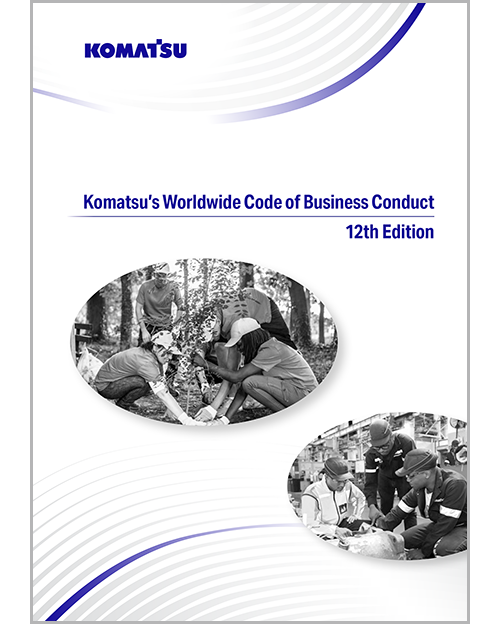
Contents
| Part IGuidance for Business Conduct |
|---|
|
1. Stakeholder Relations (1) Customers (2) Shareholders and Investors (3) Distributors and Supply Partners (4) Local Communities |
|
2. Business Operations with Integrity and Fairness (1) Fair and Free Competition (2) Anti-Bribery: Relationship with Governmental Agencies and Officials (3) Proper Export Control (4) Firm Approach Against Anti-Social Groups (5) Protection and Management of Information (6) Customary Practices |
|
3. Respect for Human Rights |
|
4. Employment (1) Human Resources Management Policy (2) Occupational Safety and Health Policy |
|
5. Environmental Protection |
|
6. Disclosure of Information (1) Disclosure of Information (2) Appropriate Financial Reporting (3) Prevention of Insider Trading |
|
7. Internal Control Systems and Compliance Framework (1) Internal Control Systems (2) Compliance Framework |
| Part IIRules to be Observed by Employees |
|---|
|
1. Ethical and Proper Business Conduct (1) Fraud (Behavior detrimental to company assets and value, and behavior for improperly pursuing company profits/interests) (2) Bribes and Kickbacks (vis-à-vis customers, suppliers, distributors, etc.) |
|
2. Conflicts of Interest |
|
3. Antitrust Compliance and Fair Competition |
|
4. Anti-Bribery: Relationship with Governmental Agencies and Officials |
|
5. Export Control |
|
6. Trade Secrets and Proprietary Information |
|
7. Non-Discrimination/Harassment |
|
8. Employee Privacy |
|
9. Safety and Health |
|
10. Safety and Reliability of Products and Services |
|
11. Environment |
|
12. Disclosure |
|
13. Internal Control Systems (1) System of Internal Control (2) Internal/External Auditor Cooperation (3) Records Retention |
|
14. Financial Controls and Records |
|
15. Prohibition of Insider Trading |
Komatsu's Worldwide Code of Business Conduct is available at:
| Established |
January 1, 1998 |
|---|---|
| Last revised |
April 1, 2024 (12th edition) |
| Languages |
18 languages Japanese, English, Chinese, Spanish, Portuguese, German, Dutch, Italian, Polish, French, Swedish, Finnish, Indonesian, Thai, Russian, Tamil, Taiwanese, Korean |
The "Five Principles of Compliance" (the “Five Principles”) are the fundamental compliance actions that must be adhered to by all companies and employees within the Komatsu Group. These principles, summarized in short phrases, were established in 2006 and have been revised once since then.
To ensure employees are reminded of and follow the “Five Principles” daily, posters are displayed in the workplace.
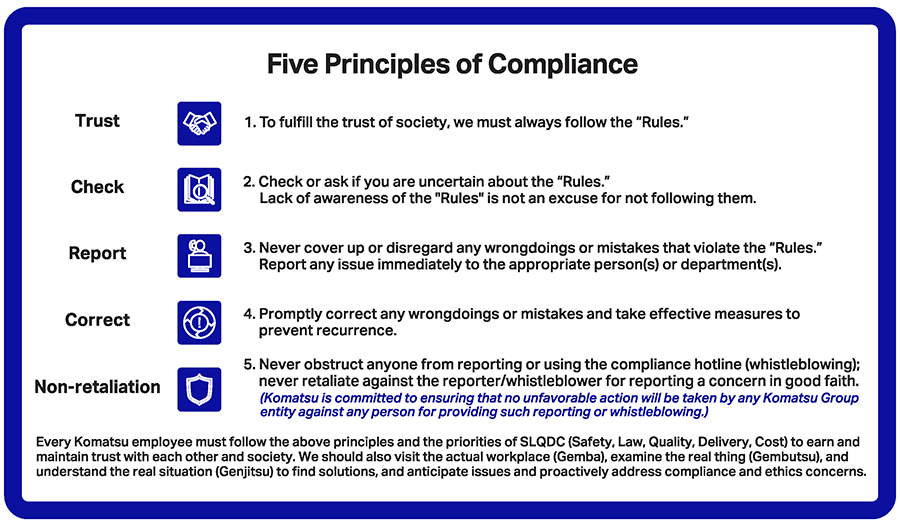
Komatsu systematically implements hierarchical training programs across various levels of officials and employees. These programs are conducted as needed within domestic affiliated companies, overseas subsidiaries, construction equipment DB and forklift dealers, as well as partner companies.
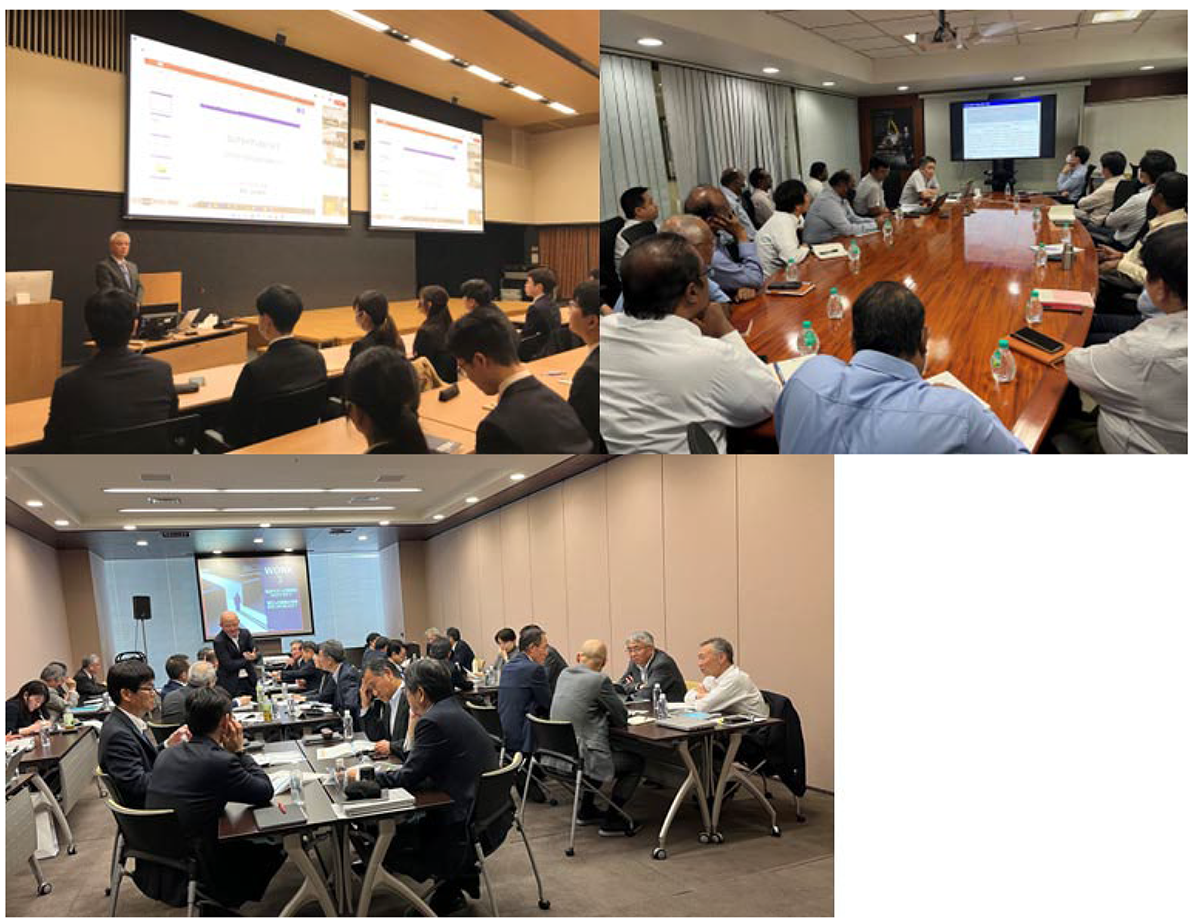
| Educational targets | |
|---|---|
| Komatsu group (Overseas and Japan) | All employees |
| Komatsu and domestic affiliated companies | Executive officers |
| Employees at all hierarchical levels | |
| Employees scheduled for overseas assignments | |
| Factories and business headquarters | |
| Overseas subsidiaries | Managerial level |
| Construction equipment DB and forklift dealers | For managers / all employees |
| Partner companies | For managers / leaders |
| Number of participants | |
|---|---|
| Global training on the code of conduct (e-learning and group training) | Approx. 27,130 people |
| <Group training (overseas)> Individual training by request |
Approx. 130 people (with instructors dispatched from Japan) |
| <Group training (in Japan)> ・Level-based training ・Individual training by request |
1,490 people 4,440 people |
"Compliance for Everyone " is a monthly information magazine on compliance. Since it was first published in 2006, this magazine has kept being distributed to all Komatsu Group employees on the first working day of each month.
The magazine covers a wide range of topics beneficial to all employees, from legal matters to communication, manners, morals, and ways of thinking.
In addition to the regular edition, a summary edition highlighting key points for use in morning assemblies and meetings, and a visualized edition visualizing the content are published as well.
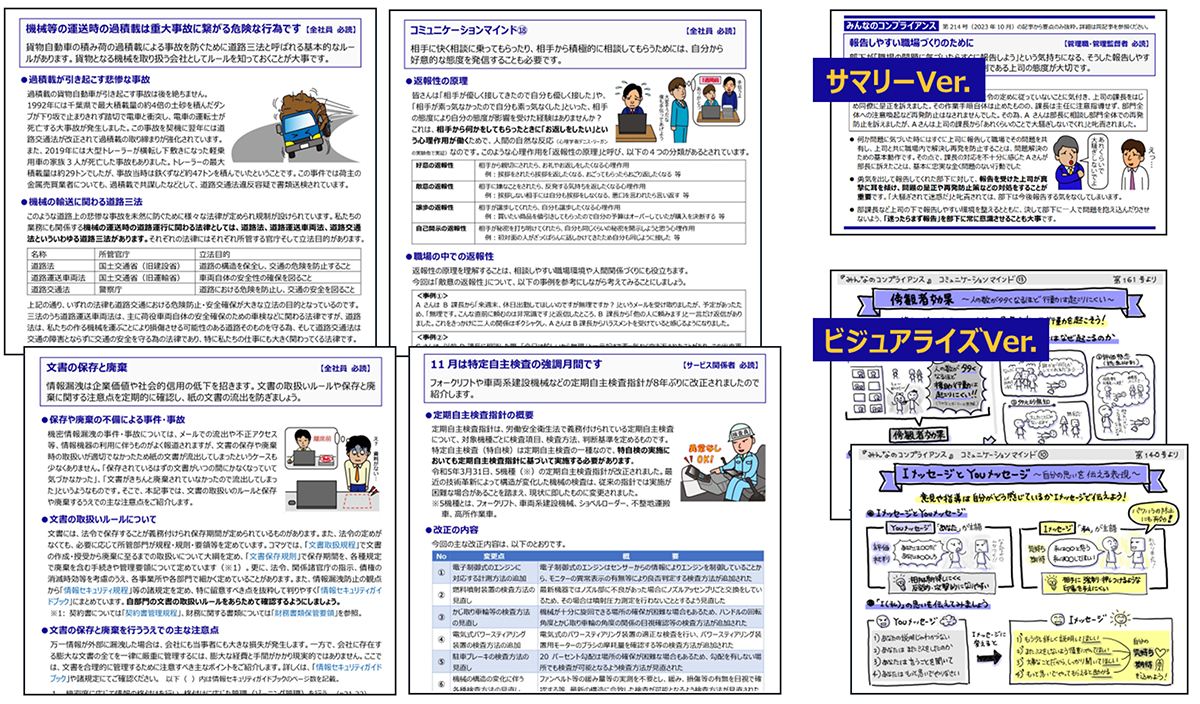
The "Compliance Portal" is an intranet platform where Komatsu Group employees can access essential information about compliance. It includes details on the "Compliance Hotline" and the "Komatsu’s Worldwide Code of Business Conduct," as well as educational materials and relevant regulations. This portal is used to share information and ensure that all Komatsu Group employees are well-informed about compliance matters.
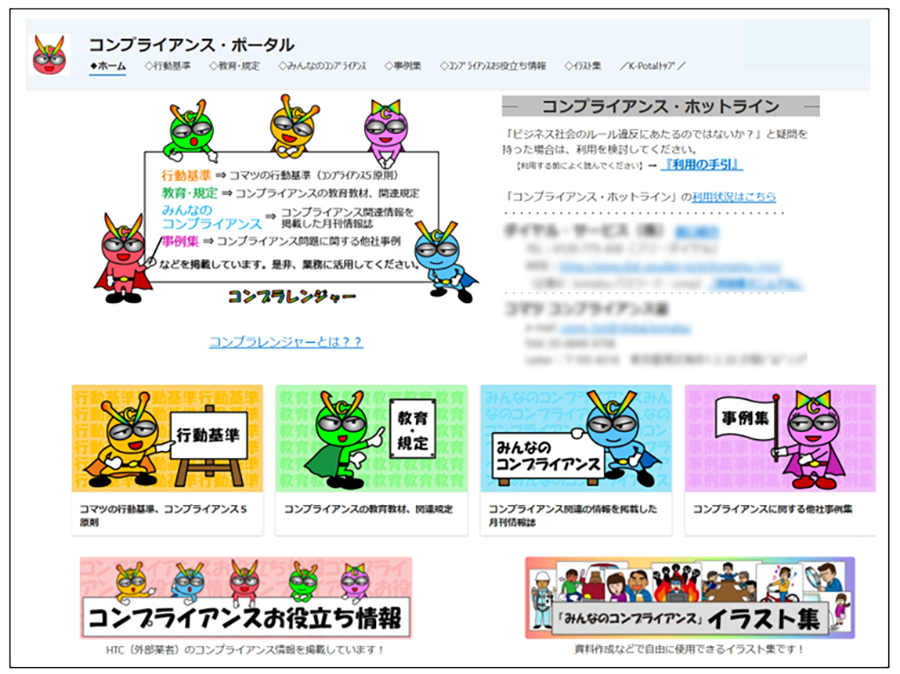
The purpose of these measures is to facilitate the early detection, correction, and prevention of potential compliance issues within the workplace. This involves gathering information during regular operations to identify any actions that might violate laws, internal regulations, or business society rules.
【Workplace Compliance Interview】
The aim of these interviews is to provide opportunities for supervisors and subordinates to discuss and reflect on compliance issues. This is done through a formal interview format to ensure thorough communication and understanding.
【Web Survey】
These surveys, conducted in questionnaire format, target all employees of Komatsu and its group companies on a biennial and alternating basis. They also serve as compliance awareness surveys.
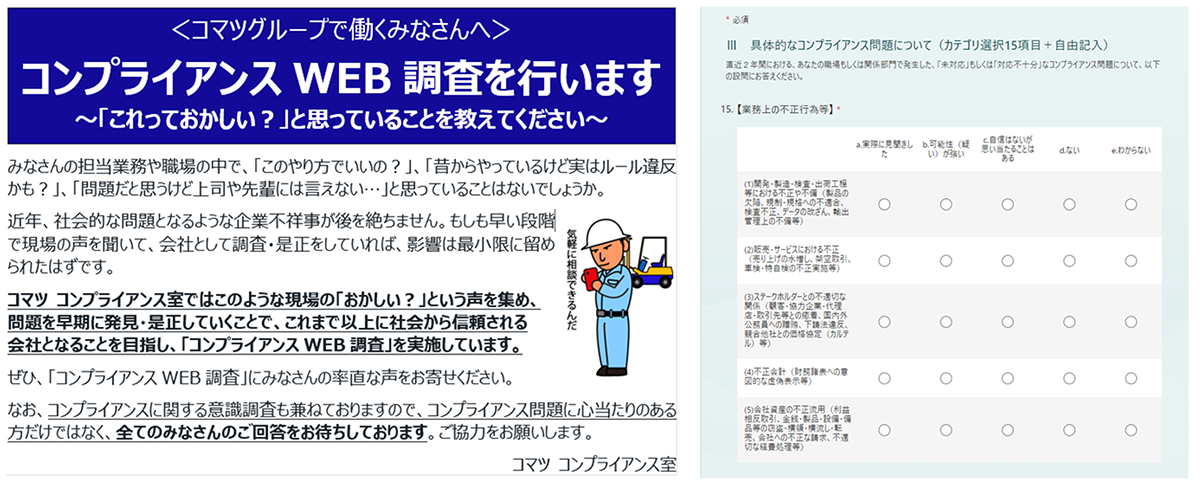
To address inquiries and reports from group employees regarding rules of business conduct, we have established a Global Compliance Hotline at our headquarters as a point of contact. This aims to detect and correct issues at an early stage. The hotline includes both an internal contact managed by the Compliance Department and an external contact operated by an independent specialist organization. The Compliance Department investigates all reports, regardless of the contact point used, in cooperation with relevant departments. For particularly serious cases, investigations may be outsourced to external lawyers. Additionally, Komatsu Group companies have set up and operate regional compliance hotlines to ensure that all employees in each region can make inquiries or reports. The availability of the hotline is communicated through global training on “Komatsu’s Worldwide Code of Business Conduct.”
It is clearly stated in “Komatsu’s Worldwide Code of Business Conduct,” the “Five Principles of Compliance,” and each company’s employment regulations that employees who make legitimate reports will not suffer any disadvantage as a result of such reporting. This encourages active use of the system. Measures are also taken to protect the confidentiality of information related to reports by giving careful consideration to investigation procedures.
The system is available to all individuals regardless of employment type (full-time, temporary, dispatched, part-time, etc.). It is also accessible to business partners and to former employees within one year of leaving the company, if the report concerns Komatsu. Anonymous reports are also accepted.
Internal whistleblowing hotline
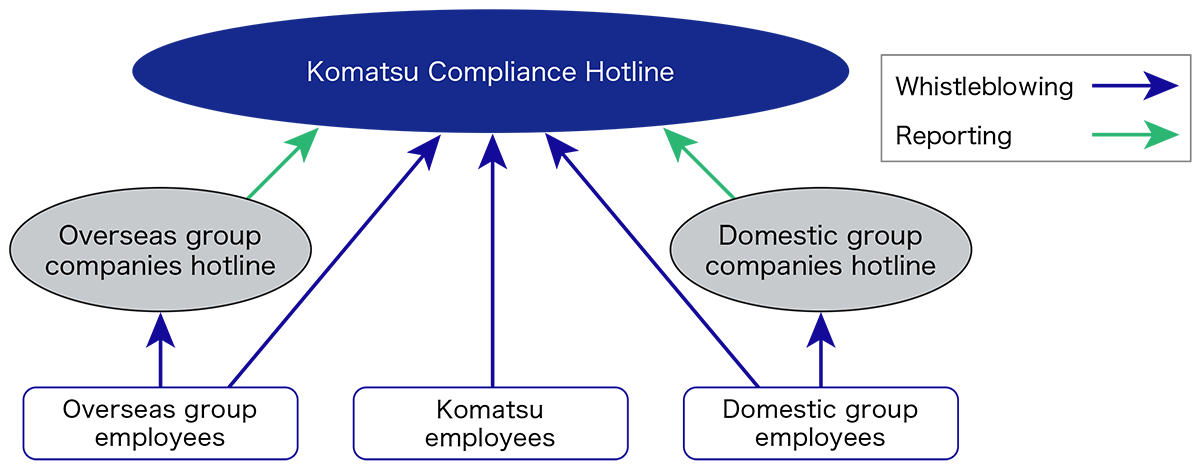
Whistleblowing process

As part of our risk management activities, Komatsu has been conducting compliance risk audits (CR Audits) since FY 2008.
We have established various external consultation hotlines. To maintain appropriate procurement activities within the Komatsu Group, “Supplier Consultation Hotline” is established to address and rectify issues reported by suppliers, particularly those concerning violations of the Subcontract Act. "Driver Consultation Hotline," is also established to specifically address transportation-related inquiries from drivers in response to the 2024 Logistics Issue. These hotlines aim to identify and resolve individual problems effectively.
If any issues arise, we take prompt corrective actions, investigate the root cause, and strive to prevent recurrence.
1. Number of compliance violations in FY 2024
| Item | Scope | FY2024 | Unit | |
|---|---|---|---|---|
| Number of violations of Komatsu’s Code of Business Conduct*1 | Corruption or Briber | Global | 0 | case(s) |
| Discrimination or Harassment | Global | 3 | ||
| Customer privacy data | Global | 0 | ||
| Conflict of interest | Global | 0 | ||
| Money laundering or Insider trading | Global | 0 | ||
2. Regarding anti-corruption
| Number of employees who were dismissed because of conflict with Komatsu's anti-corruption policy (global) |
FY 2024: Zero |
|---|---|
| Fines imposed on Komatsu related to corruption / amount of penalties (global) |
FY 2024: Zero |
| Number of employee training sessions on anti-corruption prevention (in Japan) | FY 2024: 12 times Approx. 120 people (planned overseas assignment) |
| Establishment of internal reporting system related to corruption (global) | Prevention of corruption is specified in "Komatsu's Worldwide Code of Business Conduct" as a key priority issue. If there is any suspicion or concern involving corruption or the violation of business society rules, concerned parties are invited to use the Global Compliance Hotlines established at the Komatsu Head Office or within each region to report the problem. |